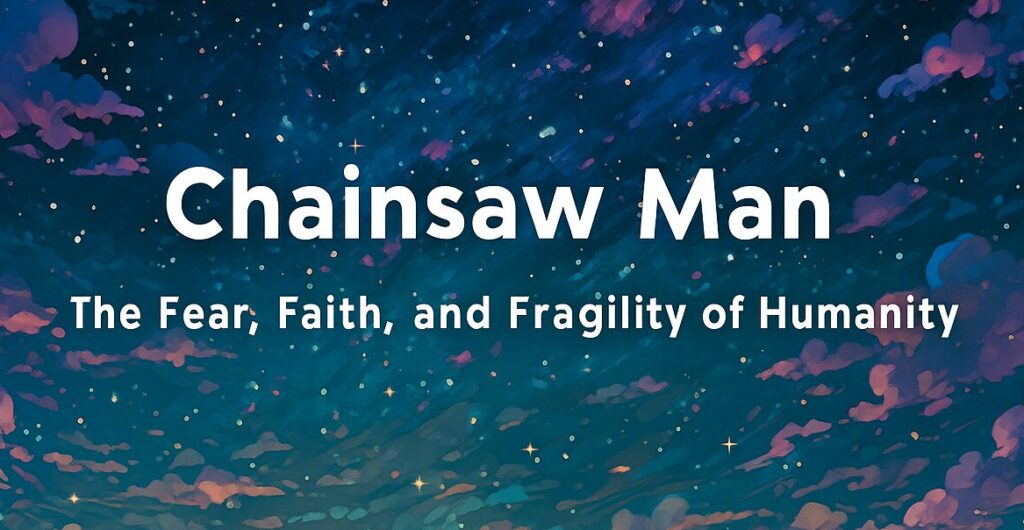
Chainsaw Man is often described as brutal, grotesque, and chaotic.
Yet beneath the screams and the splatter lies something far more human — a quiet meditation on fear, love, and what it means to exist in a world ruled by both.
Tatsuki Fujimoto’s story is not simply about devils and violence, but about the fragile emotions that make people cling to life even when life itself seems meaningless.
The World of Fear — Devils as Mirrors of the Human Heart
In Chainsaw Man, devils are not mere monsters.
They are born from humanity’s fears — tangible forms of the emotions we refuse to face.
The Gun Devil embodies collective terror and the way societies weaponize fear for control.
The Control Devil, in contrast, represents humanity’s darker wish: to dominate, to possess, to be the one who decides what others feel.
Each devil grows stronger the more it is feared.
It’s a simple rule, yet profoundly symbolic.
Fear gives power — not only in this story, but in reality.
The more we believe in something’s hold over us, the more it rules us.
In that way, devils function almost like gods born from anxiety — sustained by the worship of our deepest insecurities.
“The more you fear, the more it rules you.”
Denji’s Door — The Symbol of Repressed Memory
Throughout the series, Denji often dreams of a door — one he is warned never to open.
At first glance, it seems like a random image, a surreal touch in a chaotic world.
But the door is more than that.
It represents what Denji cannot bear to remember — his pain, his guilt, his buried humanity.
Behind that closed door lies the truth of his past, the kind of truth that reshapes identity.
The warning, “Don’t open it,” isn’t meant to protect him from danger — it’s his own mind trying to protect itself.
To open the door would be to accept the unbearable, to face what has been hidden away to survive.
“Behind every closed door lies a truth too painful to face.”
That single symbol — a door — says more about trauma than any flashback could.
It’s the boundary between who Denji is and who he once was.
Makima — Love, Control, and the Illusion of Salvation
Makima is often seen as a manipulator, a puppeteer behind every tragedy.
But to understand her is to understand the story’s most complex idea: the difference between love and control.
Makima does not love Denji; she possesses him.
Her kindness is calculated, her affection conditional.
She offers him what he craves — warmth, recognition, purpose — but only as long as he remains obedient.
It’s not romance. It’s religion.
For Denji, who has never been truly loved, Makima’s control feels like salvation.
He mistakes manipulation for care, chains for comfort.
In that way, Chainsaw Man becomes a tragedy of emotional illiteracy — a boy who confuses ownership for affection because he’s never been shown the difference.
“Control disguised as compassion.”
Makima’s “love” mirrors the world itself — a system that demands loyalty in exchange for belonging, devotion in exchange for survival.
Pochita — The Devil That Wanted to Be Loved
Pochita is unlike any other devil.
He doesn’t embody fear; he embodies longing.
His wish is not to be worshipped or feared, but simply to be loved.
The small orange creature that becomes Denji’s heart is more human than most humans in the story.
His love is unconditional — he gives his body, his life, and his very being so Denji can live freely.
It’s the purest form of affection in a world built on selfish desire.
Many fans have noticed that “DOG” is “GOD” spelled backward.
Whether intentional or not, the symbolism fits perfectly.
Pochita represents a divine kind of love — one that doesn’t demand anything in return, one that heals rather than feeds on fear.
“Even devils crave the warmth of being loved.”
In a universe where every being is defined by fear, Pochita stands as the one creature defined by love.
The Meaning of Humanity in a World of Monsters
So what does it mean to be human in Chainsaw Man?
The answer, perhaps, is found not in strength, but in vulnerability.
Humanity in this world isn’t about moral superiority.
It’s about the ability to feel — to cry, to mourn, to regret.
Denji may act monstrous, but his capacity for sorrow makes him more human than those who claim to protect the world.
Every time Denji cries, the story pauses.
For just a moment, the noise stops — and we see the small, scared boy inside the chainsaw.
A boy who wanted nothing more than a normal life, who found meaning not in glory, but in the simple act of being understood.
“Being human means choosing to feel — even when it hurts.”
That’s what separates him from the devils: the courage to feel pain, to live through it, and to keep going anyway.
Conclusion — Love as Rebellion
In the end, Chainsaw Man isn’t about violence or chaos — it’s about love in a world that has forgotten what love is.
Every character, every devil, every tragedy is an echo of that loss.
Makima seeks control because she cannot comprehend affection.
Humans worship fear because they cannot accept vulnerability.
Denji, who begins as the most broken of them all, becomes the only one capable of genuine love — even if it destroys him.
Love, in Fujimoto’s world, is rebellion.
To care in a world built on fear is the ultimate act of defiance.
And maybe that’s why Denji, the boy with a chainsaw for a heart, became something greater — a symbol of humanity’s desperate wish to be loved, even in hell.